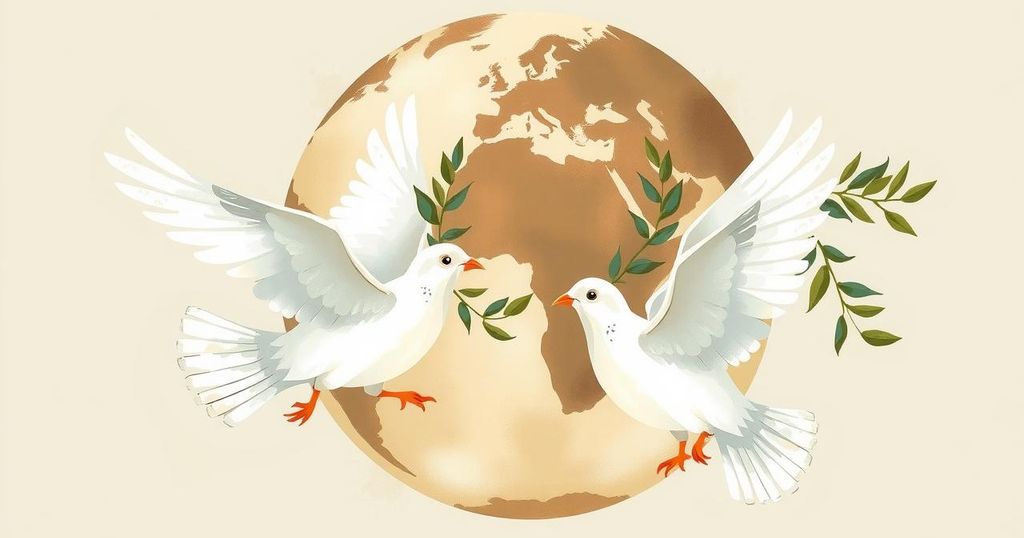Trump Announces Ceasefire Between Iran and Israel
President Donald Trump announced on Monday a staggered ceasefire between Iran and Israel aimed at ending a conflict marked by missile exchanges and casualties on both sides. The ceasefire is set to begin with Iran halting operations at 0400 GMT Tuesday, followed by Israel twelve hours later. This development comes after a week of escalating violence, including unprecedented U.S. airstrikes and missile attacks. World leaders express concern over the potential for further conflict.
In a surprising development, President Donald Trump announced on Monday that a staggered ceasefire between Iran and Israel has been agreed upon, aiming to bring an end to an escalating conflict that could have drawn in the United States. Trump made the declaration via his Truth Social platform, stating, “It has been fully agreed by and between Israel and Iran that there will be a Complete and Total CEASEFIRE,” though no official confirmation emerged from either Iranian or Israeli sources.
This conflict has seen a devastating exchange of missile fire over the past week, leading to hundreds of casualties in Iran and at least two dozen in Israel, as reported by officials from both countries. The U.S. had also become embroiled in the hostilities over the weekend with unprecedented strikes on Iranian nuclear sites, which spurred Iran to retaliate on Monday by targeting an American base in Qatar—an attack Trump characterized as “very weak.”
According to Trump’s proposal, the ceasefire will initiate a 24-hour phased process starting at approximately 0400 GMT Tuesday, during which Iran will unilaterally halt its operations. Twelve hours later, Israel is expected to follow suit, and Trump pledged that an official end to the 12-day war would be acknowledged worldwide at the conclusion of the first 24-hour period. He emphasized that both nations should remain “peaceful and respectful” throughout the ceasefire phases.
Meanwhile, reports from AFP correspondents indicate that loud explosions were heard in Tehran overnight following warnings from the Israeli army for residents in central Tehran to evacuate. A decrease in hostilities would bring significant relief to global leaders worried about a possible escalation into a larger conflict.
The back-and-forth missile exchanges began after Israel launched surprise strikes against Iran’s nuclear and military sites on June 13. In response to the U.S. joining Israel’s campaign with airstrikes on Iranian facilities, Iran claimed to have targeted Al Udeid Air Base to signal its dissatisfaction with U.S. actions. Despite the attack, Trump reported that no American lives were lost, indicating Iran’s measured approach.
Iran’s National Security Council explained that their missile attack was a direct response to U.S. actions, asserting that their retaliation was purposefully limited in scope. Ali Vaez, a senior advisor at the International Crisis Group, remarked that the calibrated response from Iran was communicated to avoid causing casualties among American forces.
The air assault on the U.S. base in Qatar came following a series of American strikes on Iranian nuclear installations. International leaders like French President Emmanuel Macron called for de-escalation, insisting that “the spiral of chaos must end,” while Chinese officials expressed apprehension about the potential economic fallout from the escalating situation.
Iran’s missile barrage was indeed intended as a warning shot, and although Qatar warned of “blatant aggression,” the Qatari government emphasized its right to respond proportionally. Iranian state media reported that missiles struck Al Udeid, which had already been evacuated as a precaution.
In Tehran, celebrations erupted among some residents, as state TV broadcast images of Iranians waving flags, chanting “Death to America.” Meanwhile, Qatar temporarily closed its airspace amid rising tensions, and the U.S. embassy in Doha warned citizens to shelter in place. The conflict has been catastrophic, with reported fatalities exceeding 400 individuals in Iran and 24 in Israel amid missile exchanges in the ongoing hostilities. The Israeli army has issued warnings to evacuate residents in Tehran, stating operations to target Iran’s military infrastructure were underway.
In summary, President Trump’s announcement of a staggered ceasefire between Iran and Israel could mark a crucial turning point in a conflict that has caused substantial loss of life on both sides. While the ceasefire seeks to lessen hostilities, the situation remains volatile with potential repercussions for regional stability. Global leaders remain alert and concerned about the broader implications of this conflict, hoping for a lasting resolution whilst navigating the delicate tensions.
Original Source: www.jamaicaobserver.com




Post Comment